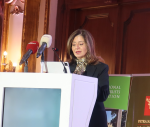You are here
The fake, the bad, and the ugly
Jan 28,2018 - Last updated at Jan 28,2018
Not long ago, a dear friend of mine introduced me as the only person he knows who lives by his passion. He has a point, because communication is my work and a passion that marked every stage of my life since childhood.
I mention this to justify why I was swept by the global excitement when the Internet penetrated almost every home.The communication revolution, we believed, would bring people together, make unlimited information accessible to everyone, and help eliminate conflict by creating more channels for diversity, reflection and dialogue than ever existed before.
In those heady days, people defended a piece of information by saying: “I read it on the Internet.” Twenty years later, the outlook is very different, because people quickly learned how to use digital technology to reinforce their bad habits.
In the old days, people bought a whole newspaper; so even though they only read only one section, they glanced at headlines in other sections and learned at least snippets of information in the process. But with digital filtering people eliminate any information outside their narrow sphere of interest, and they interact only in echo-rooms, or homogenous digital environments that are impervious to differing perspectives and opinions.
Sadly, therefore, the communication revolution helped disinformation and prejudice to thrive, unchallenged by opposing viewpoints and in the absence of constructive dialogue. Disinformation, as we saw recently in Jordan, spreads quickly because it appeals to the insatiable greed so easily aroused in human beings: The thirst for power.
And to make things worse, politicians in major democracies have started to claim a monopoly on truth by dismissing unwelcomed information as “fake news”. The tragedy of this style of debate is that it discredits others, presenting them as enemies, or even traitors.
It was therefore heartening that Pope Francis should have decided to address a message on the 52nd World Communications Day. In this message, which was released by the Vaticanhttps://zenit.org/articles/pope-francis-message-for-world-communications..., the Pope emphasised the importance of “education for truth”. He says that: “An impeccable argument can indeed rest on undeniable facts, but if it is used to hurt another and to discredit that person in the eyes of others, however correct it may appear, it is not truthful. We can recognise the truth of statements from their fruits: whether they provoke quarrels, foment division, encourage resignation; or, on the other hand, they promote informed and mature reflection leading to constructive dialogue and fruitful results.”
Truth, the Pope argues, is not grasped when it is imposed from without as something impersonal, but only when it flows from free relationships between persons, listening to one another.
But how do you make them listen? Historically, problems arose because someone did not listen or would not listen. Today information is so personalised that one listens only to viewpoints that reinforce his prejudices. The great challenge facing the communication industry is how to carry people beyond what they want to hear and inform them of what matters in their society and in the world.












